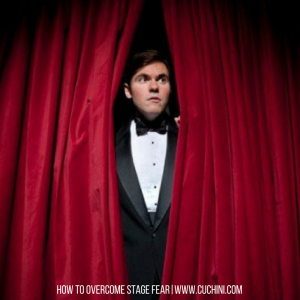 There are two types of people in the world: those who love speaking in public and those who are scared stiff at the thought of it. Performance anxiety and stage fright are perfectly normal phenomena that occur to many people. It is important for you to understand what stage fright is, so that you can fully overcome it.
There are two types of people in the world: those who love speaking in public and those who are scared stiff at the thought of it. Performance anxiety and stage fright are perfectly normal phenomena that occur to many people. It is important for you to understand what stage fright is, so that you can fully overcome it.
Stage fright or performance anxiety is a persistent phobia which is aroused in an individual when required to perform in front of an audience. So how do you overcome stage fright when speaking in public?
1. Know your stuff
Nothing will stop stage fright in its gripping tracks like being prepared. Know your content, your speech and more importantly your audience. If you know what you are talking about then you have no reason to be nervous.
Understanding your topic will enable you to speak more naturally and hence more confidently. Also, should a technical hitch occur, this won’t faze you as you are already confident on the subject.
2. Talk yourself down
You need to realize that even though stage fright is “all in the mind,” the fear manifests itself in physical ways. The best offence is to change your negative talk. Stop worrying about, “What if I forget the content?”
Change that into positive talk like, “What if I am great at this?” It may sound simplistic or too easy, but positive affirmation will go a long way in reducing stage fright when speaking in public.

3. Wallow in the worst
If you can’t calm yourself down with positive talk, then maybe it is time you thought about the worst case scenario. Once you do this, you’ll realize that the worst case scenario isn’t really that bad. This might help calm your nerves.
4. It is not all about you
Though you might feel like everyone is out to laugh, criticize or judge you, that is not the case. Get over the feeling that the world is going to hang on your every mistake.
Focus on your speech, audience and what they deserve from you. This will ease the pressure that is already accumulating.
5. Keep calm, don’t rush it
Don’t rush your presentation. Start slow and allow yourself time to get into a comfortable pace. You need time to get used to the audience and the audience also needs time to get used to you.

6. Don’t share your mistakes
You have prepared, practiced and feel good about your speech or presentation. Suddenly, on stage you realize you mixed the order of topics or you forgot an important point. But remember, you’re the only one who knows about this. Your audience doesn’t. So, don’t make them aware of a mistake that they didn’t even know existed. If you bring it up, some people might start looking for more holes, which ultimately distracts from the whole purpose of your presentation in the first place.
7. Arrive early
Obviously, if you are late, this will only heighten your anxiety. Arrive early and acclimate to your surroundings. You can even check out the stage and the auditorium as get yourself used to the environment.
 Did you enjoy this article?
Did you enjoy this article?






